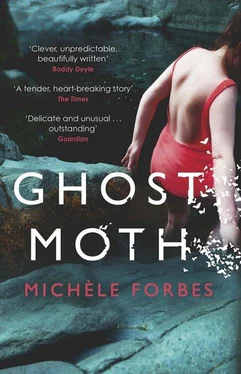One of the tables at the fair, a folding card table with a felt-covered top, displays some fragrant items, small bars of lavender soap, a bottle of shampoo, bubble bath in a snowman that has been sitting around since Christmas, and a miniature bottle of 4711 eau de cologne. Another of the tables, a box turned upside down and draped with a beige head scarf, displays an assortment of books— The Lodger, The Reluctant Legionnaire— and a few well-read copies of the Reader’s Digest . There are also two children’s books on the table, ones Maureen and Elizabeth had felt were too babyish for girls their age.
The table nearest the end of the garden is the white elephant stall, upon which they have arranged all sorts of oddments in various clusters: rubber balls, pieces of Lego, a doll’s bed with one of its legs broken, some pencils, an eggcup with BUTLINS HOLIDAY CAMP printed on it, Twinkle comics, a skipping rope, and a small papier-mâché mountain with grass painted on its flanks and a long winding river of blue ribbon that Elizabeth had made.
Elsa had thought how strange the words white elephant were together as she had written them on a piece of paper with her green crayon. She still had no idea what this expression actually meant, even though Maureen had taken pains to explain it to her. “Just things, different things together. Oddments. You know!” But the more Maureen had become impatient with Elsa, the less Elsa understood what Maureen was explaining.
Earlier that morning, Elsa had watched as Maureen had developed a plan for the afternoon. On the oddment table — before it had officially been entitled the white elephant stall — Maureen had found a blue glass ball, the size of a large orange, which was nestled in a straw-colored lacy bag. When the light caught the glass ball, it shimmered aquamarine, sea green, and pinks. No one knew where the glass ball had come from. Katherine had suspected that it had been part of a promotional gift she had received when she had bought two pairs of nylons. But she couldn’t quite remember.
Maureen had lifted the blue glass ball out of its lacy home and taken it with her to Katherine’s bedroom. Elsa, curious to know what her big sister was up to, had followed her up the stairs and had sat quietly outside the room, watching through the half-opened doorway. Maureen had then selected her means of transformation by prospecting through her mother’s wardrobe. She had tied a green paisley scarf around her head and a brown woolen scarf around her shoulders and had secured one of Katherine’s skirts, a mushroom-colored calf-length cotton one, around her waist with a soft leather belt. She had walked around the bedroom in majestic circles, her skirt swishing and swooshing as she did so. Then she had fingered the contents of the little cream ceramic dish that sat on Katherine’s dressing table, and which held a few pieces of Katherine’s jewelry. But not finding what she needed there, she had opened her mother’s wooden jewelry box. The lid of the box was painted as if it had been embroidered with fine threads displaying little spots of cerise and sage upon a yielding black. The sudden movement of the box had set its tiny mechanics whirring and releasing the delicate plink plink of the opening notes of the theme from The Third Man. Maureen had found the looped earrings she had been looking for in the scented honey-colored innards of the box and had clipped one on each ear. She had smeared the lids of her eyes with a deep green and had reddened her lips. Then, holding up the hem of her skirt and angling her head to one side, she had paraded up and down the floor of the bedroom in front of the oval mirror of the dressing table, admiring her daring transformation into Madam Maureen, fortune-teller extraordinaire.
The wooden clotheshorse, draped with sheets and blankets, provided the structure for the walls of Madam Maureen’s fortune-telling tent. A pink cotton sheet, fastened to the sides with clothes pegs, was its low slung ceiling.
Maureen had stuck a sign saying A PENNY FOR YOUR FORTUNE on the front of the tent and had hung a pink silk scarf over its entrance.
Katherine had a little book of cloakroom tickets, which she said she would give out to people so that they would know what number they were in the queue. They could give Maureen the money before they left the tent. Maureen had begun to feel a little nervous as her mother was explaining this to her.
By the time Maureen had declared her tent officially open, Elizabeth and Elsa had just finished organizing various games for the fair. They had a pin the tail on the donkey game. The donkey — drawn by Elizabeth with crumbling white chalk on an old freestanding blackboard they had found in the coal shed — had legs of different sizes, each of which disappeared off the bottom edge of the blackboard in search of a hoof. The tail had been cut out from paper and colored with brown crayon, and a small lump of Plasticine had been placed where the tail should be attached to the donkey. They had a game of hoopla set up on a tea tray on the grass, with prizes of a little woolen doll, which Elizabeth had knit at school; a felt rabbit belonging to Maureen, which she said she had outgrown; and a small teddy with a pinched expression and tiny beads for eyes, which no one could remember owning. It was the setting up of the three upturned plastic buckets by the apple tree that Elsa and Elizabeth had found to be the most frustrating, as Stephen had kept picking up the buckets and taking them away to some other place in the garden and then filling them with stones, or carrots from the kitchen, or putting his socks in them.
Peter Barnsley had been the first to arrive at the fair, and indeed had been the only visitor for the first fifteen minutes or so. Elizabeth and Elsa had said nothing to him. Instead, they had watched him with a burning sense of disappointment as he paraded around the garden, his hands stuffed deep into his pockets, his nose dirty, sporting a wide proprietorial grin on his face. This had not been the opening to the fair that they had expected. Where was the excited rush of people?
Katherine had gone into the house to answer the telephone and to change Stephen’s nappy. Maureen had been sitting in her fortune-telling tent all the while, quiet and expectant in the heat. It had seemed like a very long time before enough people had appeared to make it feel like the fair had indeed begun.
Next in line to arrive, after Peter Barnsley, had been the Wilson children. All four enormous children had wandered awkwardly and aimlessly around the garden from one table to the next with blank expressions on their faces. Elsa had watched them and had thought of Mr. Wilson, their father, with his shiny accordion. Mr. Wilson was a tiny man who had eyes that were permanently half-closed — a condition he had been born with — so whenever he wanted to look up, he had to tilt his head right back until it nestled between his shoulder blades. An unfortunate combination, Elsa had thought, his height and his eyes. On bonfire nights Mr. Wilson always played “She’ll Be Coming ’Round the Mountain” and the Protestant loyalist anthem “The Sash My Father Wore” with a feverish agility, always working up to a stirring rendition of “Spanish Eyes.” Elsa often wondered if he thought of his own eyes when he played it.
Then Mrs. Hamilton had arrived with her incredibly noisy twin boys, Kenneth and Keith. One of the twins — Elsa thought it might have been Kenneth, but she had never been sure — had been recently expelled from school for setting fire to the caretaker’s dog. Mrs. Hamilton had apparently just shrugged her shoulders in the principal’s office when she had been called in to explain, saying in a watery tone of voice, “Oh, boys will be boys.”
Читать дальше












